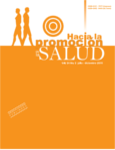Authors
Abstract
Objective: Promotion of health allows to put into practice theoretical foundations that can improve health behaviors of the population, for which it is necessary to develop a health promoting lifestyle. A positive approach to generate health in young adults is to promote the salutogenic approach to health by encouraging the use of resources the person has and developing a sense of coherence. The main objective of this paper is to identify a health promoting lifestyle and its relationship with the sense of coherence in young adult university students in Sonora, Mexico. Materials and methods: descriptive, correlational study with 300 undergraduate students. Prior informed consent, a sociodemographic data card, the Life Style Questionnaire II and the Sense of Coherence-13 Scale were applied. Results: young adults showed enough general health promoting lifestyle (51.0%), with a higher incidence in women (52.1%). Health sciences students (55.2%) obtained an insufficient health promoting lifestyle and there was statistically significant difference by career. The general sense of coherence was high (52.0%), being predominant in men (58.0%) and in health sciences students (57.2%); there was no statistically significant difference according to gender and careers. It was evidenced that a sufficient health promoting lifestyle fosters the development of a high sense of coherence. Conclusions: it is essential to establish programs for the development of life skills to ensure better health and well-being of future generations of young adults by promoting the development of a sense of coherence.
References
2. Ministerio de Salud. Norma técnica para la detección temprana de las alteraciones del embarazo [Internet]. 2000 [cited 2017 May 25]. Available from: Available from: https://www.minsalud.gov.co/sites/rid/Lists/BibliotecaDigital/RIDE/VS/PP/norma-tecnica-para-la-deteccion-temprana-embarazo.pdf
3. Ministerio de Salud. Norma técnica para la detección temprana de las alteraciones del crecimiento y desarrollo en el menor de 10 Años [Internet]. 2000 [cited 2018 Feb 16]. Available from: Available from: https://www.minsalud.gov.co/sites/rid/Lists/BibliotecaDigital/RIDE/VS/PP/6Deteccionalteracionesdelcrecimiento.pdf
4. Congreso de la República de Colombia. Ley 1438 de 2011. Por medio de la cual se reforma el Sistema General de Seguridad Social en Salud y se dictan otras disposiciones [Internet]. 2011 [cited 2017 May 23]. Available from: Available from: http://www.alcaldiabogota.gov.co/sisjur/normas/Norma1.jsp?i=41355
5. Santillán L. Entre la ayuda y el desligamiento: prácticas y regulaciones cotidianas sobre las familias y el cuidado infantil en barrios populares del Gran Buenos Aires - aportes desde la etnografía. Civitas. 2013; 13(2): 316-335
6. Barna A. Convención Internacional de los Derechos del Niño. Hacia un abordaje desacralizador. Kairos. 2012; 16(29): 1-19
7. Bernstein B. La estructura del discurso pedagógico. Clases, códigos y control. Madrid: Morata; 1993
8. Bourdieu P, Passeron JC. La reproducción. Elementos para una teoría del sistema de enseñanza. México D.F.: Fontamara; 1998
9. Barrios M. Marginalidad y violencia social en el centro de Bogotá. Universidad Nacional de Colombia; 2013
10. Peñaranda F. La crianza como complejo histórico, sociocultural y ontológico: una aproximación sobre educación en salud. Rev Latinoam Ciencias Soc Niñez y Juv. 2011; 9(2): 945-56
11. Otálvaro J. La crianza del niño trabajador: una reflexión desde la salud pública. Rev Fac Nac Salud Pública. 2011; 29(4): 495-503
12. Reason P, Bradbury H. Introduction: Inquiry and participation in search of a world worthy of human aspiration. In: Reason P, Bradbury H, editors. Handbook of action research. London: Sage; 2001. p. 1-14
13. Freire P. Pedagogía del oprimido. México D.F., México: Siglo XXI Editores; 1975
14. Gómez J, Lopez A. Estudio de caso: caracterización histórica y socio-demográfica del asentamiento Altos de Oriente del municipio de Bello. Medellin; 2010
15. Cendales L. El proceso de la investigación participativa: investigación acción participativa. Aportes y desafíos. Bogotá: Dimensión Educativa; 1994
16. Organización Panamericana de la Salud. Orientaciones para el desarrollo de proyectos: Investigación acción participativa. Washington, EE.UU.: Author; 1988
17. Stern D. La constelación maternal. Un enfoque unificado de la psicoterapia con padres e hijos. Barcelona, España: Paidós Ibérica.; 1997
18. Rawls J. Teoría de la justicia. México D.F.: Fondo de Cultura Económica; 1997
19. Sen A. La idea de la justicia. Bogotá, Colombia: Santillana Ediciones Generales, S.A.; 2010
20. Sandel M. Justice. What’s the right thing to do? New York: Farrar, Straus and Giroux; 2009
21. Törnblom K, Vermunt R. Distributive and procedural justice: research and social applications. Burlington: Ashgate; 2007
22. Campana M. Para una lectura crítica del desarrollo humano. Andes [Internet]. 2013; 24(2): 299-323. Available from: http://www.scielo.org.ar/scielo.php?script=sci_arttext&pid=S166880902013000200001&lng=es&tlng=es
23. Lizárraga F. Rebelion. Por un diálogo entre el marxismo y el igualitarismo liberal [Internet]. 2008 [cited 2017 May 18]. Available from: Available from: http://www.rebelion.org/noticia.php?id=70714
24. Santos B de S. Reinventando la emancipación social [Internet]. 2007 [cited 2017 May 25]. Available from: Available from: http://bibliotecavirtual.clacso.org.ar/ar/libros/coedicion/boavent/cap1.pdf
25. Hernández M. Desigualdad, inequidad e injusticia en el debate actual en salud: posiciones e implicaciones. In: Asociación Latinoamericana de Medicina Social, editor. Taller Latinoamericano de Determinantes Sociales de la Salud. México D.F.; 2008. p. 16
26. Breilh J. La determinación social de la salud como herramienta de ruptura hacia la nueva salud pública (salud colectiva). [Internet]. 2013 [cited 2017 May 15]. Available from: Available from: https://es.scribd.com/document/191860596/Breilh-Jaime-La-determinacion-social-de-la-salud-como-herramientade-ruptura-hacia-la-nueva-salud-puublica-salud-Colectiva-Seminario-Inter-de-Sal
27. Almeida N. La ciencia tímida. Buenos Aires, Argentina: Lugar Editorial; 2000
28. Menéndez E. Estilos de vida, riesgos y construcción social. Conceptos similares y significados diferentes. Estud Sociológicos. 1998; 16: 37-67
29. Fitzpatrick K, Tinning R. Health education’s fascist tendencies: a cautionary exposition. Crit Public Health. 2013; 24(2): 132-42
30. Leahy D. Assembling a health[y] subject: risky and shameful pedagogies in health education. Crit Public Health. 2014; 24(2): 171-81
31. Bernstein B. La estructura del discurso pedagógico. Clases, códigos y control. Madrid: Morata.; 1993. 236 p
32. Benhabib S. El ser y el otro en la ética contemporánea. Feminismo, comunitarismo y posmodernismo. Barcelona: Gedisa; 1992
33. Honneth A. Reconocimiento y menosprecio. Sobre la fundamentación normativa de una teoría social. Buenos Aires: Katz; 2010
34. Berger P, Luckmann T. La construcción social de la realidad. Buenos Aires: Gedisa; 1968
35. Zanchetta MS, Kolawole B, Perreault M, Leite LC. Scientific and popular health knowledge in the education work of community health agents in Rio de Janeiro shantytowns. Health Educ Res. 2012; 27(4): 608-23


 PDF
PDF
 FLIP
FLIP




























